December 2023
Dr. Imogen Coe
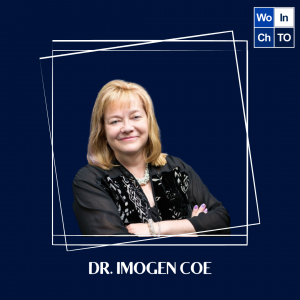
Dr. Imogen Coe is a British-born biochemist. She earned her BSc at the University of Exeter in the UK, followed by an MSc and a PhD studying comparative molecular neuroendocrinology at the University of Victoria. She then joined the University of California San Francisco as a postdoctoral fellow studying adenosine transporters, and was later awarded an Alberta Heritage Foundation for Medical Research Postdoctoral Fellowship at the University of Alberta. She served on the faculty at York University for several years before joining Toronto Metropolitan University (TMU), where she served as the founding Dean of the Faculty of Science from 2012–2018. She is currently a professor in the Department of Chemistry & Biology at TMU. She is also an affiliate scientist in the Li Ka Shing Knowledge Institute at St. Michael’s hospital, where her research group studies the biology of drug transporters which are proteins that facilitate entry into cells of anti-cancer and anti-viral drugs.
In addition to her research, Dr. Coe is a vocal advocate for the engagement, retention, recruitment, and promotion of girls and women in science. She is internationally recognized as a Canadian thought leader in the areas of inclusion, diversity, equity, and accessibility (IDEA) in science, technology, engineering, and math (STEM). Dr. Coe has advised academic, government, and industry on best practices to improve EDI in STEM. She has also received numerous awards, such as the Angela Hildyard Award in EDI (Senior Women Academic Administrators of Canada) and being named one of Canada’s Top 100 Women in the Trail Blazer category (WXN) for her advocacy work promoting equity in STEM.
You can learn more about Dr. Co by visiting her website - https://imogencoeconsulting.ca/ and listening to her TEDx talk on gender equity in science!
October 2023
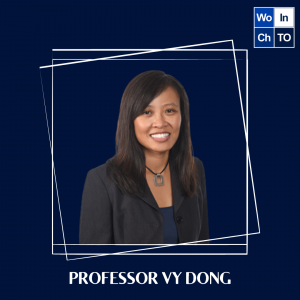
Vy Dong (1976 - Present)
Prof. Vy Dong is the Chancellor’s Professor in the Department of Chemistry at the University of California (UC) – Irvine. Vy completed her undergraduate degree at the UC – Irvine, and her master’s at the UC – Berkeley and her PhD at CalTech, both under the supervision of Dr. David MacMillan. She then completed a postdoc as a NIH postdoctoral fellow at the UC – Berkeley working under the supervision of Drs. Robert Bergman and Ken Raymond. Vy began as an assistant professor at the University of Toronto in 2006, was promoted to an associate professor with tenure in 2010 and become the Adrian Brook Distinguished Professor in 2011. She returned to the UC – Irvine as a full professor in 2012, and became the Chancellor’s Professor in 2023.
Vy’s research group works on the development of new catalytic reactions using transition metal catalysts (e.g. Rh-hydride, Co-hydride catalysts, etc.) to effect various transformations such as hydroacylation, hydroamination, hydrogenation and dehydrogenation reactions, as well as the synthesis of natural products, specifically macrocyclic peptides such as dichotomin E.
She has won many awards throughout the years including Merck, Sharp & Dohme Award (2020), ACS E.J. Corey Award (2019), ACS Arthur C. Cope Scholar Award (2010), Alfred P. Sloan Research Fellowship (2009-2011), Boehringer Ingelheim Young Investigator Award (2008-2011) and Merck Frosst Young Investigator Award (2007).
Learn more about Prof. Vy Dong and her research here: https://sites.google.com/uci.edu/vydonggroup/home?authuser=0
September 2023

Sheharbano "Sheri" Sangji (1986 – 2009)
Sheri Sangi was a 23-year-old staff scientistic working at the University of California, Los Angeles for Dr. Patrick Harran while applying to law school. The research group focused on the development of analogs of natural products in order to develop treatments for cancer and obesity. Sheri’s project involved the use of a t-BuLi reagent with vinyl bromide, to produce vinyl lithium which would be then taken forward to the next reaction. After completing the reaction on a small scale, she notified the laboratory post-doc that she was going to scale up the reaction to the order of 160 mL of the pyrophoric reagent. However, an accident occurred while Sheri was drawing up the lithium agent, leading her to catch on fire. Devastatingly, Sheri was not wearing a lab coat, leading to second and third-degree burns on nearly half her body. Eighteen days after the fire, Sheri’s family took her off life support.
Sheri’s death was preventable and opened the eyes of many to the systemic safety failures found in academic chemistry laboratories. Sheri was never properly trained to use pyrophoric reagents, nor was she issued a lab coat. However, Sheri will never be forgotten; the impact of the accident that occurred more than 10 years ago is still felt. The story of Sheri and the importance of proper laboratory safety is shared within the chemistry community. Accidents happen, but with knowledge of chemical handling safety, emergency procedures, and previous accidents, the severity can be limited.
You can read more about Sheri Sangji here: https://www.thestar.com/news/world/2014/03/30/a_young_lab_worker_a_professor_and_a_deadly_accident.html
May 2023
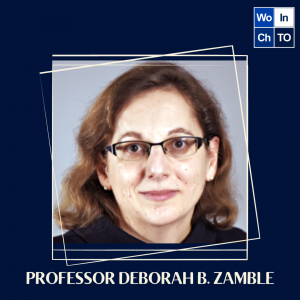
Deborah B. Zamble (1971 – 2020)
Deborah B. Zamble was a Professor of Chemistry & Biochemistry at the University of Toronto (St. George). Before returning to her undergraduate alma matter as a professor in 2001, she completed her PhD. at MIT with Stephan Lippard and then post-graduate work with Christopher Walsh at Harvard. Her passion to put it simply was nickel, devoting much of her time to understanding its tight regulation. Her group uses a plethora of techniques to demystify the movement of nickel through bacterial cells, focusing greatly on the metalloproteins involved in binding to and regulating nickel. Her work in the bioinorganic field emphasized the importance of trace metals, such as nickel, that are sometimes overlooked due to their scarcity in nature and biology (there are only nine nickel - containing enzymes to this day that have been discovered!). She served on many editorial boards, including the Journal of Biological Chemistry and has won numerous awards including the Queen Elizabeth Diamond Jubilee Medal.
Not only was she a dedicated scientist, but also went above and beyond when it came to teaching and science outreach. She pioneered the popular second year undergraduate course offered at U of T called CHM209: Science of the Modern Kitchen, which stemmed from her love of all things food (and chocolate). Through this course she also worked with not-for-profit organizations such as CAGIS (Canadian Girls in Science) to develop outreach events that would get young girls excited about science and chemistry. Many women who have had the pleasure of interacting with Deborah would let you know how she strongly believed that as women we should never limit ourselves and continually push our boundaries.
She was an inspiring and hard – working scientist, who valued open access to science and emphasized the importance of scientific integrity. She has trained and set free many scientists into the real world who all possess her curiosity and tenacity for striving to understand the unknown.
April 2023
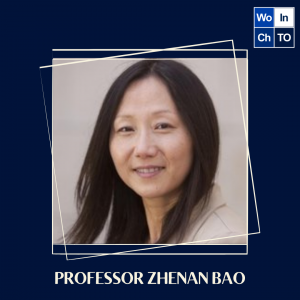
Zhenan Bao (? - Present)
Prof. Bao is the K.K. Lee Professor of Chemical Engineering at Stanford University, with courtesy appointments in Chemistry and Material Science and Engineering. She has been the Department Chair of Chemical Engineering since 2018. She founded the Stanford Wearable Electronics Initiate (eWEAR) in 2016 and serves as the faculty director. She is also an affiliated faculty member of Precourt Institute, Woods Institute, and Center for Advanced Molecular Photovoltaics & Bio-X. Moreover, Bao is a co-founder and on the Board of Directors for C3 Nano and PyrAmes, both are silicon-valley venture funded start-ups. She serves as an advising Partner for Fusion Venture Capital. Her research areas include the synthesis of functional organic and polymer materials, organic electronic device design and fabrication, and application development for organic electronics.
Professor Bao received her Ph.D. in Chemistry from the University of Chicago in 1995. Prior to joining Stanford in 2004, she was a Distinguished Member of Technical Staff in Bell Labs, Lucent Technologies from 1995-2004. She has received numerous awards for her work, including the following: the VinFuture Prize Female Innovator, the ACS Chemistry of Materials Award, the MRS Mid-Career Award, AIChE Alpha Chi Sigma Award, the ACS Central Science Disruptor and Innovator Prize, the Gibbs Medal by the Chicago session of ACS, Wilhelm Exner Medal by Austrian Federal Minister of Science, ACS Award on Applied Polymer Science, L'Oréal-UNESCO For Women in Science Award in the Physical Sciences, AICHE Andreas Acrivos Award for Professional Progress in Chemical Engineering, ACS Carl Marvel Creative Polymer Chemistry Award, ACS Cope Scholar Award, Royal Society of Chemistry Beilby Medal and Prize, IUPAC Creativity in Applied Polymer Science Prize, etc. Bao was also selected as Nature’s Ten people in 2015 as a “Master of Materials” for her work on artificial electronic skin.
You can find out more about Prof. Bao’s research group here: https://baogroup.stanford.edu/
March 2023

Linda Nazar (? - Present)
Dr. Linda Nazar is a Distinguished Research Professor at the University of Waterloo, and Tier 1 Canada Research Chair in Solid State Energy Materials. Dr. Nazar completed her undergraduate degree with awards at UBC, and joined the Ozin lab at U of T where she completed her PhD. She has received many awards and honours throughout her research career, recognizing her substantial contributions to research, including Officer of the Order of Canada, Thompson Reuters’ World’s Most Influential Scientific Minds, and three Most Highly Cited distinctions. Her work has been instrumental in the progress toward understanding and improving cutting-edge battery materials, in the face of increasing global energy storage needs. Dr. Nazar and her group are seeking to advance reusable, stable, and inexpensive battery technologies by leveraging structure-property and interface relationships of mixed solid materials. Most recently, the group - in collaboration with the Joint Center for Energy Storage Research (JCESR), an Energy Innovation Hub led by the U.S. Department of Energy’s (DOE) Argonne National Laboratory - has discovered a new ultra-stable chloride solid electrolyte which might be the next step to increasingly viable all-solid batteries.
You can read more about Prof. Nazar’s research group here: http://www.science.uwaterloo.ca/~lfnazar/
February 2023
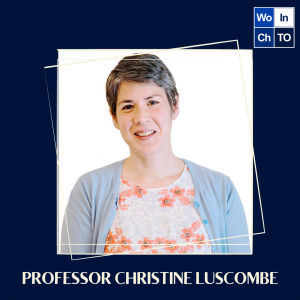
Christine Luscombe (? - Present)
Christine Luscombe is a Professor at the Okinawa Institute of Science and Technology Graduate University (OIST), known for her research focused on the synthesis of semiconducting polymers for organic electronics and photovoltaics. In the past few years, her research has expanded to include the analysis of microplastic pollution within marine organisms using techniques such as Raman spectroscopy and artificial intelligence. She currently serves as the IUPAC Polymer Division President and on the Polymer Education and Polymer Terminology Subcommittees.
At the University of Cambridge, Luscombe received her Bachelor's degree in Natural Sciences before working with Prof. Andrew Holmes and Prof. Wilhelm Huck for her PhD in the Melville Laboratory of Polymer Synthesis. She then completed her post-doctoral fellowship at UC Berkeley, working in Prof. Jean Fréchet on semiconducting polymers for organic photovoltaics.
In 2006, she became a professor in the Materials Science and Engineering Department at the University of Washington where she received numerous awards such as the NSF CAREER Award, DARPA Young Faculty Award, and the Sloan Research Fellowship.
In 2021, Luscombe shared her perspective on racism in the US in a C&EN article titled "Asian scientists are rethinking the American dream". With an increase in anti-Asian hate incidents being reported in the US since the start of 2020, Asian scientists in the US started speaking out more about their experiences with racism. Luscombe helping to highlight such an important issue resonated with others in the scientific community and the courage to share her insights was appreciated.
You can find out more about Prof. Luscombe’s research group here: https://groups.oist.jp/picpu/christine-luscombe
For the full C&EN article: https://cen.acs.org/policy/Asian-chemists-scientists-discrimination-collaboration-suspicion-attacks/99/i17
Twitter: @luscombe_OIST
January 2023

Teri W. Odom (? - Present)
Teri W. Odom is the Joan Husting Madden and William H. Madden, Jr. Professor of Chemistry and Chair of the Chemistry Department at Northwestern University. She received her B.S. in Chemistry from Stanford University and Ph.D. in Chemical Physics from Harvard University. Odom carried out postdoctoral work at Harvard University before starting her career at Northwestern University in 2002. She is an expert in designing structured nanoscale materials that exhibit extraordinary size and shape-dependent optical and physical properties.
Odom's research group focuses on multi-scale, anisotropic, and 3D plasmonic materials for applications in imaging, sensing, and cancer therapeutics. Her select honors and awards include: the RSC Centenary Prize; the ACS National Award in Surface Science; the NIH Director’s Pioneer Award; and the MRS Outstanding Young Investigator Award. She is currently the Editor-in-Chief of Nano Letters.
